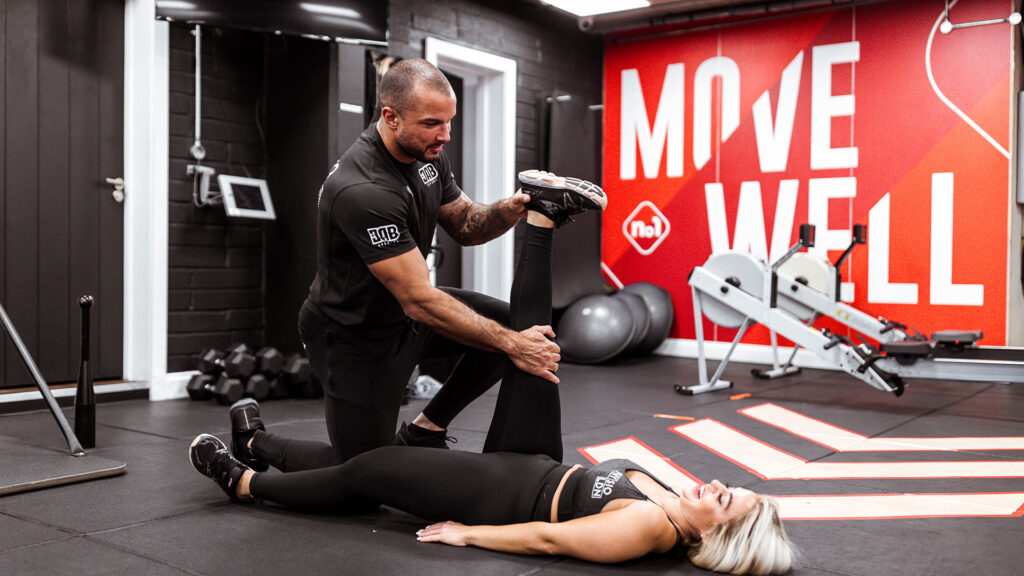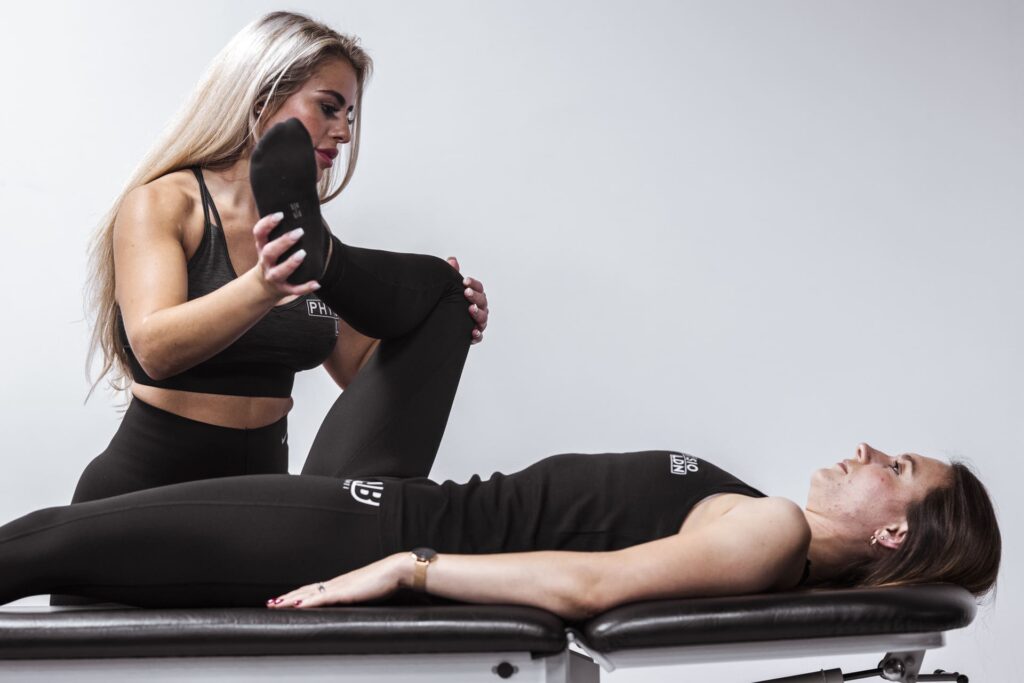Table of Contents
Main Takeaways
- Strong Link: Extra body weight increases joint stress, accelerating cartilage wear and knee osteoarthritis.
- Stats: A 5.1% weight loss yields clinically significant relief for knee pain and disability (AAFP 2024).
- Risks: Weight gain ≥6 kg raises knee pain risk by 1.62x; gaining 11 lbs increases knee surgery risk 34% (women)and 25% (men).
- Obesity Impact: Knee pain prevalence rises from 12.1% (underweight) to 55.7% (class III obesity).
- Weight Loss Benefits: Reduces pain, inflammation, and surgery risk, and improves mobility and quality of life.
- Best Strategies:
- Diet: Whole foods, anti-inflammatory ingredients (fish, turmeric, ginger).
- Exercise: Low-impact (swimming, cycling), strength + flexibility training.
- Physiotherapy: Tailored rehab, manual therapy, and education at One Body LDN.
- Holistic Approach: Combines weight management, physical therapy, and mental well-being support for optimal outcomes.
Knee pain is a widespread issue that affects millions globally, often linked to the burden of excess body weight. The relationship between weight and knee health is complex but crucial to understand, especially as obesity rates continue to rise. Carrying additional pounds places significant stress on the knee joints, accelerating wear and tear and increasing the risk of osteoarthritis and chronic pain.
In fact, research shows that even modest weight loss can lead to meaningful improvements in knee pain and disability for those with overweight or obesity. According to the American Academy of Family Physicians, a total body weight loss of just 5.1% results in clinically significant relief of symptoms.
If you’re local, exploring knee pain treatment in London can help you access targeted care and faster recovery alongside weight-management strategies.
This article explores how excess weight affects knee health, effective diet and exercise strategies to manage weight, and the benefits of weight loss for knee pain. It also highlights the role of expert physiotherapy in supporting recovery and long-term joint health, particularly in London where specialized care is accessible.
How Excess Weight Affects Knees
Excess body weight exerts increased mechanical load on the knee joints, which can accelerate cartilage breakdown and contribute to osteoarthritis development. The knees bear much of the body’s weight, so even small increments in weight can significantly increase joint stress. A study analyzing data from the Korea National Health and Nutrition Examination Survey found that weight gain of 3–6 kg and ≥6 kg corresponded to 1.28 and 1.62 times higher risks of knee pain, respectively, illustrating the direct link between weight gain and knee discomfort (MDPI).

Moreover, the accumulation of visceral fat and higher body fat percentages are associated with heightened pain sensitivity, as shown by a 2021 study published in BMC Musculoskeletal Disorders. This means that excess fat not only increases mechanical strain but also amplifies the perception of pain.
Weight gain also increases the likelihood of requiring invasive interventions. Research presented at the International Congress on Obesity revealed that gaining just 11 pounds raises the risk of needing knee replacement surgery by 34% for women and 25% for men (The Washington Post). Additionally, the prevalence of knee pain dramatically rises with increasing obesity class, from 12.1% in underweight individuals to 55.7% in those with class III obesity (BMI ≥40) (Wiley Online Library).
Furthermore, the impact of excess weight on knee health extends beyond mere physical discomfort; it can also lead to a cycle of reduced mobility and increased weight gain. Individuals experiencing knee pain may find it challenging to engage in physical activities, which are crucial for maintaining a healthy weight and overall fitness.
This sedentary lifestyle can exacerbate weight issues, creating a vicious cycle that further deteriorates knee health. A study published in the Journal of Orthopaedic Research emphasizes that even modest weight loss can alleviate pressure on the knees, highlighting the importance of weight management in preventing joint deterioration.
In addition to physical implications, the psychological effects of living with knee pain and excess weight can be profound. Many individuals may experience feelings of frustration, anxiety, or depression due to their limitations in mobility and the social stigma associated with obesity.
A survey conducted by the American Psychological Association found that individuals with obesity are more likely to report low self-esteem and body image issues, which can further hinder their motivation to engage in healthy behaviors. Addressing both the physical and emotional aspects of weight management is essential for improving knee health and overall quality of life.
Best Diet and Exercise Strategies
Addressing knee pain related to excess weight requires a balanced approach combining dietary changes and physical activity. Weight loss of 20% or greater has been shown to produce better clinical outcomes without the need for surgical or pharmacologic interventions, according to Stephen Messier, lead author of a landmark study from Wake Forest University (inquirer.com).
Dietary strategies should focus on creating a sustainable calorie deficit while ensuring adequate nutrition to support joint health. Emphasizing whole foods such as fruits, vegetables, lean proteins, and healthy fats can reduce inflammation and promote weight loss. Consulting with nutrition professionals can help tailor plans to individual needs and preferences.
Additionally, incorporating anti-inflammatory foods such as turmeric, ginger, and fatty fish can further aid in reducing joint pain and improving overall health. Staying hydrated is also crucial, as proper hydration helps maintain joint lubrication and function.
Exercise is equally important, but it must be adapted to protect the knees. Low-impact activities like swimming, cycling, and walking are excellent choices that improve cardiovascular health and muscle strength without excessive joint strain. Strengthening the muscles around the knee, particularly the quadriceps and hamstrings, provides additional joint support and stability.
Incorporating flexibility and balance exercises, such as yoga or tai chi, can enhance mobility and reduce the risk of falls, which is particularly beneficial for those managing knee pain.
Physiotherapy plays a vital role in designing personalized exercise programs that optimize knee function while minimizing pain. At clinics such as One Body LDN in London, expert physiotherapists combine hands-on treatments with tailored exercise regimens to enhance recovery and prevent future injury.
Working with a professional knee pain physiotherapist ensures your program is individualized, progressive, and aligned with your health and performance goals.They often utilize modalities like ultrasound therapy and electrical stimulation to alleviate pain and promote healing, while also educating patients on proper body mechanics and posture to prevent further strain on the knees.
This comprehensive approach not only addresses immediate concerns but also empowers individuals with the knowledge and tools needed for long-term joint health.
Benefits of Weight Loss
The benefits of weight loss for individuals suffering from knee pain are profound and multifaceted. Even modest reductions in body weight can significantly decrease pain and improve mobility. The American Academy of Family Physicians highlights that a 5.1% total body weight loss leads to clinically significant improvements in pain and disability for patients with overweight or obesity and knee osteoarthritis (aafp.org).

Beyond mechanical relief, weight loss can also reduce systemic inflammation, which contributes to joint degradation and pain. This holistic improvement enhances overall quality of life, allowing individuals to engage more fully in daily activities and exercise.
Engaging in regular physical activity not only aids in weight management but also strengthens the muscles surrounding the knee, providing additional support and stability. Activities such as swimming or cycling can be particularly beneficial, as they are low-impact and reduce stress on the joints while promoting cardiovascular health.
Furthermore, weight loss reduces absenteeism related to chronic knee pain. A systematic review published by the BMJ Publishing Group found that knee osteoarthritis and chronic knee pain are linked with absenteeism rates ranging from 5% to 22% over 12 months, underscoring the broader social and economic impact of effective weight management (pubmed.ncbi.nlm.nih.gov).
The ripple effect of this absenteeism can be felt not only in the workplace but also in personal relationships, as individuals may withdraw from social engagements due to discomfort or mobility issues. Addressing weight can thus lead to improvements in both professional and personal spheres, fostering a more active and fulfilling lifestyle.
Combining weight loss with other treatments such as injections, physical therapy, and pain medications can further enhance symptom control and functional outcomes. For detail information see our blog knee pain injections: types, benefits & risks. James Purtill, vice chairman of orthopedic surgery at Sidney Kimmel School of Medicine, notes that weight loss is a crucial component of a comprehensive management plan for knee osteoarthritis (inquirer.com).
This integrative approach can empower patients, providing them with a toolkit of strategies to manage their condition effectively. In addition, the psychological benefits of weight loss, such as increased self-esteem and motivation, can further encourage individuals to adhere to their treatment plans and make healthier lifestyle choices.
For those seeking expert care in London physiotherapy clinics, like One Body LDN offer award-winning services with highly trained therapists who provide personalized treatment plans. Their approach blends manual therapy, exercise rehabilitation, and lifestyle advice to help patients achieve lasting relief and improved joint health.
Moreover, these clinics often emphasize the importance of nutrition in conjunction with physical therapy, guiding patients on how to make dietary changes that complement their weight loss goals and support joint health. By focusing on a comprehensive strategy that includes both physical and nutritional elements, patients can experience a more holistic recovery journey, paving the way for enhanced mobility and a better quality of life. Paired with effective knee pain treatments, these lifestyle changes can accelerate progress and help maintain long-term joint health.
FAQ
How much weight do I need to lose to see improvement in knee pain?
Studies show that losing as little as 5.1% of your total body weight can lead to significant improvements in knee pain and disability, especially for those with overweight or obesity (aafp.org).
Furthermore, the impact of weight loss on knee pain is not just a matter of reduced pressure on the joints; it also involves biochemical changes in the body. Adipose tissue, or body fat, produces inflammatory cytokines that can exacerbate joint pain. Therefore, shedding excess weight can lead to a reduction in these inflammatory markers, potentially resulting in a more significant decrease in pain levels over time. This means that even small, manageable weight loss goals can have a profound effect on your overall joint health and mobility.
What types of exercise are best for people with knee pain?
Low-impact exercises such as swimming, cycling, and walking are recommended to reduce joint stress while improving strength and cardiovascular health. Strengthening exercises targeting the muscles around the knee also help stabilize the joint.
In addition to these activities, incorporating flexibility and balance exercises can further enhance joint function. Practices like yoga and tai chi not only improve flexibility but also promote mindfulness and body awareness, which can be beneficial for managing pain. Engaging in a variety of exercises helps to ensure that all muscle groups are strengthened and that the body remains balanced, which is crucial for preventing further injury and maintaining mobility.
Can weight gain increase the risk of knee replacement surgery?
Yes, gaining just 11 pounds increases the likelihood of needing knee replacement surgery by 34% for women and 25% for men, according to research presented at the International Congress on Obesity (The Washington Post).
This correlation highlights the importance of weight management in joint health. As excess weight places additional stress on the knee joints, it can accelerate the progression of osteoarthritis, leading to more severe pain and disability. Understanding this relationship can motivate individuals to adopt healthier lifestyle choices, including nutrition and exercise, which can serve as preventive measures against the need for surgical intervention.
How does physiotherapy help with knee pain related to weight?
Physiotherapy provides personalized exercise programs, manual therapy, and education to reduce pain, improve joint function, and support weight loss efforts. Clinics like One Body LDN in London offer expert care tailored to individual needs.
Moreover, physiotherapists can assess your movement patterns and identify any biomechanical issues that may contribute to knee pain. By addressing these underlying problems, they can help you develop a more effective and sustainable exercise routine. In addition to physical treatments, physiotherapy often includes guidance on lifestyle modifications, such as dietary advice and strategies for incorporating more physical activity into daily routines, which can further enhance weight loss and improve knee health.
Is knee pain more common in people with obesity?
Yes, the prevalence of knee pain increases significantly with obesity, rising from 12.1% in underweight individuals to 55.7% in those with class III obesity (BMI ≥40) (Wiley Online Library).
This stark contrast underscores the importance of addressing obesity not just for overall health but specifically for joint health. The mechanical overload on the knees from excess weight can lead to cartilage breakdown and joint degeneration. Therefore, weight management strategies, including dietary changes and physical activity, are crucial for individuals struggling with knee pain, as they can help alleviate symptoms and improve quality of life.
Are there non-surgical options to manage knee osteoarthritis?
Absolutely. Weight loss, physical therapy, pain medications, and injections can effectively manage symptoms and improve function without surgery, as noted by experts like Stephen Messier and James Purtill (inquirer.com).
In addition to these options, alternative therapies such as acupuncture and massage therapy have also shown promise in alleviating knee pain. These modalities can help improve circulation, reduce muscle tension, and promote relaxation, which can be beneficial for individuals dealing with chronic pain. Exploring a combination of these non-surgical approaches can empower individuals to take control of their knee health and enhance their overall well-being.
Take the First Step Towards Knee Pain Relief with One Body LDN
If knee pain is weighing you down, it’s time to take action with One Body LDN, voted as the best London physio clinic by thousands. Our award-winning team of physiotherapy experts specializes in musculoskeletal (MSK) physiotherapy, post-operative care, and sports injuries, ensuring that whether you’re a corporate office worker or an athlete, you receive a precise diagnosis and a tailored treatment plan. With a focus on results and a commitment to never oversell treatments, we offer expert assessments and rehab plans designed to fix the root cause of your problem. Don’t let your symptoms become long-term issues. Book your free initial assessment at our clinic today and feel the difference expert care can make.


